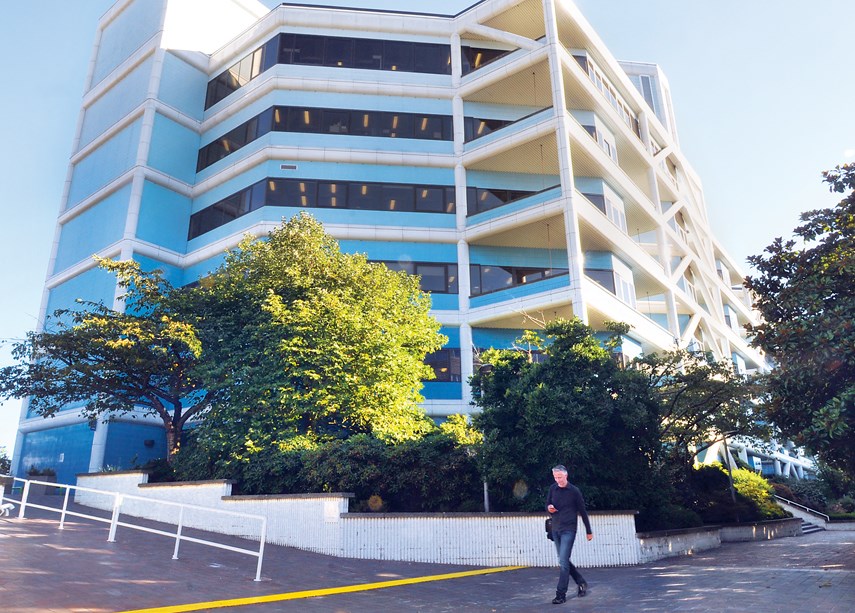ICBC rates are moving up, but the insurance provider’s head office is staying right where it is on West Esplanade – at least for now.
The previous B.C. Liberal government was considering selling the $79-million Lower Lonsdale property but Attorney General David Eby recently scrapped those plans, dubbing the idea hasty and short-sighted.
“Rushing a sale out the backdoor to the first bidders who show up is not consistent with a net benefit for the people of the North Shore, or frankly, the ratepayers of ICBC,” Eby said.
A sale was unlikely, responded North Vancouver-Seymour Liberal MLA Jane Thornthwaite.
While she wasn’t party to official discussions on the future of the building, Thornthwaite said the sale was one of numerous recommendations in a government-commissioned report.
“I don’t think that our government was going to do anything with it,” she said.
But while the NDP has no short-term plans for 151 West Esplanade, a redevelopment “can absolutely happen,” Eby said, stipulating that any major changes would follow conversations with municipal and federal governments as well as First Nations.
The decision to keep ICBC in Lower Lonsdale is good news for the City of North Vancouver, according to Mayor Darrell Mussatto.
“We certainly love having ICBC there and having those jobs that they create,” he said.
In the event the head office is moved, the city would likely explore alternative uses for the site, according to Mussatto.
The property is critical “in an area that is desperate for property for things like local jobs (and) housing,” Eby said.
However, those priorities hadn’t been considered, according to Eby.
“There’s been absolutely no attention paid to the strategic and limited nature of real estate in the Lower Mainland in the middle of the housing crisis, in the middle of a crisis of a lack of commercial space.”
Documents obtained by the North Shore News indicated $184 million may need to be spent in maintenance and upgrades on the 1980s-era building.
The value of the building dipped from $23 million in 2015 to $15.8 million in 2016, according to B.C. assessment.
While Eby acknowledged the building’s maintenance issues, he suggested selling the property would fail to solve ICBC’s larger problems.
The first time ICBC employees heard about a possible sale was when they discovered the sale had been halted, according to Annette Toth, vice-president of MoveUp, the union representing ICBC staff.
A move would’ve meant upheaval for many employees while not necessarily reducing commuting times for the majority of employees who don’t live on the North Shore.
“No matter where you put it, someone’s going to be commuting,” she said.
Eby’s decision to stop the sale came shortly before he announced a 6.4 per cent rate increase, which adds up to the average driver shelling out an extra $57 each year for basic insurance.
For drivers who favour basic and optional coverage, the increase amounts to about eight per cent, or an extra $130 annually.
The higher fees are necessary to offset the downward trajectory of ICBC’s finances, which culminated in the insurer posting losses of more than $500,000,000 in 2016, according to Eby.
Liberal MLA and former Minister of Transportation Todd Stone put the blame for the increases on the NDP, whom he blasted for choosing to: “review, defer, and dither rather than offer a concrete plan.”
The NDP has so far failed to offer meaningful measures to address collision rates, which have risen 23 per cent since 2013 and vehicle repair costs, which have shot up 30 per cent in the last two years, Stone stated.
Part of the reason those costs spiked was a lack of staff, according to Toth.
By failing to fill positions in a timely manner, ICBC employees weren’t able to audit effectively, which in turn allowed auto body shops to control repair costs, according to Toth.
Having fewer employees also contributes to a mistrust between British Columbians and the insurance provider, Toth reasoned.
“The more people can talk to you one-on-one, the less likely they are to go to lawyers,” she said.
While it took a “long time,” there have been improvements following the B.C. Liberals’ decision to add 340 staff members in 2016, according to Toth.
But while Stone touted tougher measures on fraudsters and higher rates for high-end vehicles, Eby blamed the B.C. Liberals for reaching into ICBC’s coffers.
The Liberal government of taking $1.2 billion from ICBC to help balance provincial budgets between 2010 and 2016, according to Eby.
In an effort to make the roads safer and bring costs down, Eby suggested activating red light cameras 24 hours a day, as opposed to six.
Eby also floated the notion of restricting cellphone use through motion sensors in the phone or applications that plug into the vehicle.
Those measures are intended to combat distracted driving, which is the leading cause of fatalities on B.C. roads, claiming more lives each year than impaired driving, according to a recent press release from ICBC.



